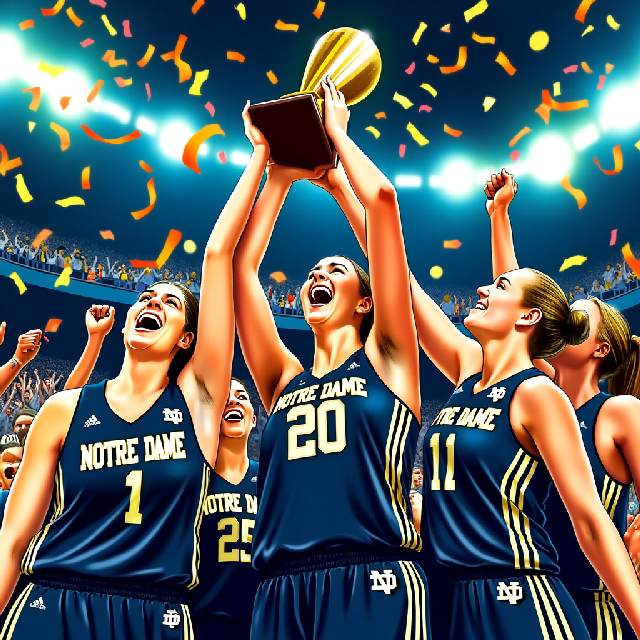Legacy of Excellence: The Notre Dame Fighting Irish Women’s Basketball
The Notre Dame Fighting Irish women’s basketball team stands as a beacon of resilience and triumph in NCAA Division I history. With two national championships (2001 and 2018), nine Final Four appearances, and a consistent presence atop the rankings, the Fighting Irish have etched their legacy through unwavering dedication and excellence.
A Rich History: Pioneers to Powerhouse
The journey began in 1977, but it wasn’t until Hall of Fame Coach Muffet McGraw’s arrival in 1987 that the program found its footing. Under McGraw’s visionary leadership, Notre Dame transformed from a fledgling team into a national powerhouse. The Fighting Irish achieved their first Final Four in 1997, marking the start of an era dominated by nine appearances since then.
Key moments include the iconic 2001 championship game, where Notre Dame defeated Purdue 68-66, led by Ruth Riley’s 18 points and 13 rebounds. This victory not only secured their first national title but also established them as a force in women’s basketball. Standout players like Skylar Diggins-Smith, who electrified the court with her leadership and skill, played pivotal roles in shaping the team’s identity.
Recent Successes: A New Era of Dominance
Under current head coach Niele Ivey, the Fighting Irish continue to soar. The 2024-25 season has been a testament to their resilience, reaching the No.1 spot in the AP Poll for the first time since 2019. With dominant victories over top-tier opponents like Duke and an undefeated ACC record, Notre Dame’s strategic brilliance shines through.
Key players have emerged as catalysts for this success. Maddie Westbeld’s versatility and Olivia Miles’ playmaking prowess exemplify the team’s depth and adaptability. Coach Ivey’s emphasis on a balanced offense and tenacious defense has been instrumental in their dominance, showcasing a modern approach to the game while honoring the program’s traditions.
Significance in NCAA Division I: Beyond the Court
Notre Dame’s impact extends far beyond the court. The program boasts one of the highest Graduation Success Rates (GSR) in Division I, reflecting its commitment to developing well-rounded student-athletes. Players like Arike Ogunbowale, whose buzzer-beating shots in the 2018 Final Four became iconic, have gone on to excel in the WNBA, embodying the Fighting Irish’s legacy of excellence.
The team’s influence is also felt in shaping NCAA tournament dynamics, often serving as a benchmark for other programs. Their games are must-watch events, drawing fans and media attention alike, thereby elevating women’s basketball’s profile nationally.
Empowering Women On and Off the Court
At Notre Dame, success is not just about winning but about nurturing leaders. The program emphasizes education and community involvement, producing alumni who excel in various fields beyond sports. This holistic approach ensures their legacy extends far beyond the hardwood, inspiring future generations of athletes and leaders.
A Legacy That Continues to Inspire
As the Fighting Irish pursue another championship, they remind us why they are a cherished part of college basketball history. With a loyal fan base cheering them on, Notre Dame remains a testament to passion and integrity in sports.
Let’s celebrate this incredible program as they continue to write their storied history! 🍀 #GoIrish #WomensBasketball #NCAA

Notre Dame’s women’s basketball team has had remarkable success with two championships (2001, 2018) and nine Final Four appearances under Coach Muffet McGraw since 1987. The current squad, led by Coach Niele Ivey, is ranked number one in the nation for the 2024-25 season. Standout players include Maddie Westbeld and Olivia Miles, while legendary alums like Ruth Riley and Skylar Diggins-Smith have made lasting impacts both on and off the court.
Notre Dame’s long-term success likely goes beyond great players. What key elements have helped them keep up their strong performances?
I’m curious about the specific factors beyond standout players and coaching changes, such as recruitment processes or institutional support, that help Notre Dame consistently maintain a high level of performance over the years.
Notre Dame’s success likely comes from strong academic support and modern facilities, plus a team culture that focuses on both performance and personal growth. Consistent coaching approaches probably help too. But it’s not just these things—a sense of community or deep commitment might also matter. Overall, their sustained high performance is likely the result of combining multiple factors effectively.